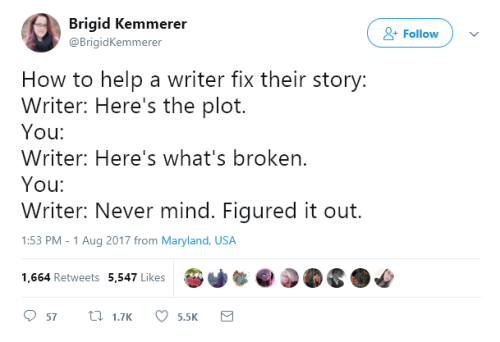Writing Tips Pt. 14 - Keep Notes And Reread
Writing Tips Pt. 14 - Keep Notes and Reread
Two important details about writing I think a lot of beginners forget is that you should be keeping notes on what you're writing, and you should reread as you go along.
Keeping notes is important so you can reference things you've established in your story. You don't want your readers jarred out of the story because Alice's hair color changed partway through simply because you couldn't remember what color you'd made it and didn't feel like double-checking. If Bob's eye color keeps changing every scene he's in, it should be for in-story reasons and not because of authorial laziness. Other things you might track with note-keeping include which spells you've given your mage character, or who a character's family members are (and whether or not they have siblings). Even professional writers keep notes on the things they'll need to reference again.
I'm partial to keeping documents in a folder on my computer on different subjects, such as character backstories, family trees, magic systems, even something as silly as where everyone sleeps in their home base. Other authors may use index cards tacked up to the wall, or establish a wiki to help them link important things together, or have a series of notebooks they can pull off the shelf to flip through. There are different ways to do this, so find one that works for you.

And make sure you reread, unless you're writing your whole story in one marathon session. Each time you go to add a new installment to the story, whether it be a new chapter to an ongoing piece or a sequel to a previous work of yours, reread the older stuff first, especially if you don't keep regular and extensive notes. You will almost invariably forget important details if you don't do this, and it's quite immersion-breaking if your story loses internal continuity because you didn't review what you'd already written.
For example, if your hero has run afoul of one of the villain's machinations, it breaks immersion if your villain's motivation for the plot changes from chapter to chapter. If he was actively trying to kill the hero, but then later claims to have just wanted to scare him, but then goes back to wanting to kill him, then was just testing a contraption and it's the hero's own fault that he got injured and now the villain doesn't know what to do without the hero, you aren't creating good drama, you're just hurting your own story's continuity. What is your villain's motivation?
Yes, I have seen this before.
So at the very least, skim over what you wrote previously to make sure you aren't breaking continuity or introducing contradictions into your story.
I frequently write stories by hand in a notebook during moments of free time. Rereading also helps me remember what I was working on when I last had to pause so I can make sure I keep the story flowing properly, rather than suddenly cutting to a different scene because I forgot where I was, or having a random character show up because I didn't remember they were supposed to be elsewhere. I've even caught a few times when I went to write a turn of phrase and thought it seemed familiar, and sure enough, I'd used it just two pages prior.
So keep notes, and make sure you reread. Your continuity will thank you.
More Posts from Kogarashi-art
This helps for a lot of things. Related is asking someone which of two options you should pick, not so that they can choose for you, but to help you figure out how you feel about it once you're told which one to do. There have been plenty of times I've asked my husband, "A or B?" and he's told me "A," only for me to go, "Great, thanks, I'm choosing B!" It's not because I'm contrary, but because him making the choice for me helped me to realize that I actually wanted B more.

Writing Tips Pt. 12 - Purple Prose
Confession time: I like my prose to be a little purple. Poetic description is fun and evocative. So I'm not going to tell you to avoid purple prose entirely.
Unless you're purposely aiming for "minimalist." Then you should avoid it.
Purple prose is writing that is often distractingly ornate and unnecessary for a given writing piece. How much (if any) you should use generally depends on the purpose of the writing piece. Are you writing an academic paper, technical document, or speech? Probably best to avoid purple prose as much as possible.
But fiction is more forgiving. You can get away with some purple in fiction, and poetry is arguably nothing but purple writing.
The important thing is to make sure you're utilizing it correctly.
So here's my advice: don't turn every descriptive sentence into an exercise in just how flowery and ornate you can be. You're trying to tell a story, not show off the biggest words you can find in the thesaurus. By all means, be poetic in describing your setting, your characters, their emotions, etc. Add interest to otherwise routine moments of action. But make sure your writing is still helping to either draw the reader in or move the story along. If your reader is distracted from the point of a section because you were too busy describing every inconsequential tree, you've probably done too much. Use it to set the stage, then simplify.
This is especially important with characters. Descriptions should help your reader visualize your character better. Think of it as painting a portrait of your character. Poetic descriptions can help a reader get an idea of who a character is, but after that, you don't necessarily need to repeat their descriptive traits every time they show up. Trust your readers to remember what your characters look like.
And when you describe your characters, vary up what you describe so that everyone isn't reduced to the same short list of physical traits on repeat. Hair and eye color are important, but they aren't the only features on your character. Give the reader the shape of a jawline, the general build of a body, the angle of a nose, or the line of a neck. Does your character have freckles, blemishes, or a sunburn? Are they stocky and muscular or thin as a rail? Challenge yourself to think of three traits to describe for any given character that aren't hair or eyes.
Finally, be careful how you're describing certain features. If you aren't careful you can easily tread into the realm of silly with your figurative language, especially when you use words that aren't used often (or are used too often, but in amateur writing only) or don't fit the time period. "Tresses" and "locks" are not commonly used for hair, and are more distracting than just calling it "hair," and this is why so many tip lists will strongly advise against "orbs" and "gems" as alternatives for "eyes." It's not romantic or creative, it's distracting.
Unless you're writing Muppet fanfic, I guess. Then you can get away with "orbs."

Writing Tips Pt. 15 - Constructive Criticism
One important thing for any writer is to learn how to receive feedback on their work so they can improve. Even professionals can continue to improve their craft, and having an outside perspective can be very important to this.
One thing I often see among novice writers is a misunderstanding of what actually constitutes "constructive criticism." I frequently see novice authors who say they want constructive criticism, but when someone leaves a comment or review that brings up anything less than absolutely positive (pointing out a flaw, expressing confusion over a character's behavior, etc.), the author responds as though the entire story, and the author by extension, has been outright insulted. They say they want constructive criticism, but what they really want is just praise.
So first you need to know what constructive criticism actually is.
Praise: when the reader is gushing over every good thing in the story. ("This is the best story ever! You're awesome! I love your characters! It was great when your characters did the thing, and I liked how you wrote the fight sequence!")
Constructive Criticism, Critique: when the reader points out the story's flaws, but also (sometimes) what the author has done well. There may not always be positives mentioned, but the overall tone will be informative rather than hateful. If the reader knows of ways to fix the flaws or otherwise improve the story, they'll also provide such suggestions. ("I really liked your story. You captured the main character's personality well, and I liked how they interacted with their nemesis. Your pacing through the fight sequence felt rushed, though. Maybe if you switched to a different POV character for that scene? Or wrote a few extra action beats in there. You also gave one character a fire spell in chapter three but previously they could only do ice magic. I love your magic system, though!")
Insults, Flames: when the reader is negative to the point of offense. The commentary will be unhelpful. ("Your story sucks! You should stop writing! Go jump in a lake!")
Now, it should be noted that praise is not bad. Only one of these three types of feedback is universally bad, and that would be the insults. Ignore these. Block the comments if you can, report them for abuse if the site you're on allows it, and move on with your day. But keep in mind that simply pointing out the story's shortcomings aren't (usually) a personal attack, even if they don't mention any positives at all. The idea is generally to help, not harm. If there is a personal attack, ignore the attack.
But if it's just actual constructive criticism, put on your big kid pants, accept or ignore (because you don't have to accept someone's constructive criticism, even if you asked for it in the first place), and and don't retaliate. Throwing a fit when someone points out your spelling errors or your gross mischaracterization just makes you look like a child. And this applies to grown adults and professional writers just as much as beginners.
But if you take the feedback with grace and dignity, even if it's to politely point out that you're not accepting constructive criticism at this time or that you have an editor but thanks for the feedback anyway, you will come across as a professional in attitude, even if you're just starting out.

for real, if you see a fic that seems abandoned but you really want to see if it might be completed
i would genuinely suggest not mentioning the fact its abandoned at all. instead, just leave the most effusive comment you can. tell the author specifically what you liked. if they are in a position they might continue it, you might remind them what they liked about the story, and thus maybe revive it.
that is probably your best bet to get a story finished, much more than asking “hey is this abandoned” or asking for it to be continued.
